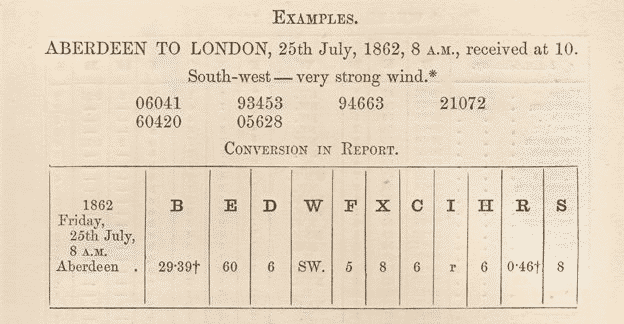The birth of the weather forecast - BBC News
Admiral Robert Fitzroy
- founded the Met Office
- was Darwin's captain on HMS Beagle in the 1830s
- invented the term "forecasts"
At the time, "Meteorological Department of the Board of trade" was a chart depot to reduce sailing times with better wind charts. Everyone relied on "wisdom" (i.e. cloud appearance, behavior of animals).
Theoretical advances:
- growing understanding of how forms functioned, i.e. anticlockwise around point of low pressure (for N hemisphere)
- widespread belief that weather was completely chaotic
When one MP suggested in the Commons in 1854 that recent advances in scientific theory might soon allow them to know the weather in London "twenty-four hours beforehand", the House roared with laughter.
Fitzroy used electric telegraph to gather real-time weather data from costs from his London office. If he thought a storm was imminent, he would alarm a harbour. Thus begun, in 1860, his storm warnings. General 2-day forecasts followed the next year, since he was basically producing them anyway for his storm warnings. "Prophecies and predictions they are not," he wrote, "the term forecast is strictly applicable to such an opinion as is the result of scientific combination and calculation."
Following a particularly successful forecast, satirical magazine Punch anointed FitzRoy their new "Clerk of the Weather" and suggested he should henceforth be known as "The First Admiral of the Blew".
They were subject to error due to little observation and forecast-by-hand. In April 1862 the newspapers reported: "Admiral FitzRoy's weather prophecies in the Times have been creating considerable amusement during these recent April days, as a set off to the drenchings we've had to endure. April has been playing with him roughly, to show that she at least can flout the calculations of science, whatever the other months might do."
"While the majority of fishermen were supportive, others begrudged a day's lost catch to a mistaken signal."
- B - Barometer
- E - Exposed thermometer in shade
- D - Difference of wet bulb
- W - Wind direction
- F - Force (on Admiral Beaufort's Scale)
- X - Extreme force since last report
- C - Cloud (1-9)
- I - Type of weather (b - blue sky; r - rain etc)
- H - Hours of rainfall
- S - Sea disturbance
Commentary: could be cool to recreate the above but with modern data, realtime.
Compiled 2025-12-01

